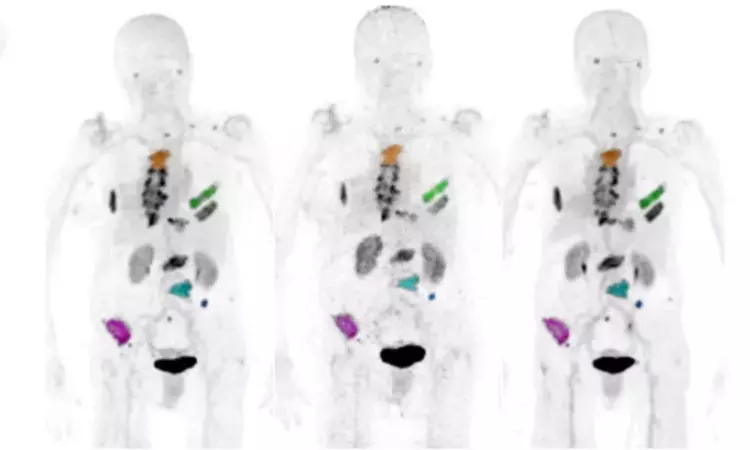- Home
- Medical news & Guidelines
- Anesthesiology
- Cardiology and CTVS
- Critical Care
- Dentistry
- Dermatology
- Diabetes and Endocrinology
- ENT
- Gastroenterology
- Medicine
- Nephrology
- Neurology
- Obstretics-Gynaecology
- Oncology
- Ophthalmology
- Orthopaedics
- Pediatrics-Neonatology
- Psychiatry
- Pulmonology
- Radiology
- Surgery
- Urology
- Laboratory Medicine
- Diet
- Nursing
- Paramedical
- Physiotherapy
- Health news
- Fact Check
- Bone Health Fact Check
- Brain Health Fact Check
- Cancer Related Fact Check
- Child Care Fact Check
- Dental and oral health fact check
- Diabetes and metabolic health fact check
- Diet and Nutrition Fact Check
- Eye and ENT Care Fact Check
- Fitness fact check
- Gut health fact check
- Heart health fact check
- Kidney health fact check
- Medical education fact check
- Men's health fact check
- Respiratory fact check
- Skin and hair care fact check
- Vaccine and Immunization fact check
- Women's health fact check
- AYUSH
- State News
- Andaman and Nicobar Islands
- Andhra Pradesh
- Arunachal Pradesh
- Assam
- Bihar
- Chandigarh
- Chattisgarh
- Dadra and Nagar Haveli
- Daman and Diu
- Delhi
- Goa
- Gujarat
- Haryana
- Himachal Pradesh
- Jammu & Kashmir
- Jharkhand
- Karnataka
- Kerala
- Ladakh
- Lakshadweep
- Madhya Pradesh
- Maharashtra
- Manipur
- Meghalaya
- Mizoram
- Nagaland
- Odisha
- Puducherry
- Punjab
- Rajasthan
- Sikkim
- Tamil Nadu
- Telangana
- Tripura
- Uttar Pradesh
- Uttrakhand
- West Bengal
- Medical Education
- Industry
Ga-68 radiotracer better than FDG for diagnosing liver cancer: Study

Bangalore: In a recent study, Indian researchers found an experimental gallium-68-based (Ga-68) radiotracer for PET/CT imaging to be more accurate than FDG for detecting primary tumors in a large group of patients with biopsy-confirmed hepatocellular carcinoma (HCC). The findings of the study were presented at the Radiological Society of North America (RSNA) 2021.
Vineel Inampudi, and colleagues compared the accuracy of PET/CT imaging with a Ga-68-labeled fibroblast activation protein inhibitor (FAPI) versus FDG for detecting primary tumors in a large group of patients with biopsy-confirmed HCC in a trial launched in 2015. They found that PET/CT imaging HCC with an experimental gallium-68-based (Ga-68) radiotracer is more effective than with FDG.
"Ga-68 FAPI-PET assessment for HCC is a useful imaging tool in terms of definitive assessment of malignancy and scores higher than FDG-PET in accuracy for diagnosing HCC," said Dr. Inampudi.
HCC is the most common primary liver cancer that occurs worldwide. F-18 FDG-PET is the most commonly used nuclear imaging modality in liver cancer and has proven effective in diagnosis, yet FDG shows variable uptake in tumors and has a sensitivity between 50% and 70%.
Fibroblast activation protein (FAP) is overexpressed in cancerous fibroblasts in tumors, and PET tracers that combine FAP inhibitors (FAPIs) with Ga-68 have demonstrated promising results preclinically for detecting cancer. These tracers are currently being investigated in several clinical studies.
In this study, Inampudi and colleagues enrolled 850 patients diagnosed with HCC on PET/CT and confirmed by biopsy between January 2015 to January 2021 at Health Care Global Enterprises Hospital in Bangalore. Of these, 443 had background cirrhosis, while 407 patients showed no chronic liver disease. All patients underwent both FDG and Ga-68 FAPI scans one day apart, and the researchers compared the SUVmax of both FDG and Ga-68 FAPI in the tumors.
Five hundred and eighty-one patients had lesions larger than 5 cm and 269 had lesions less than 5 cm in size. FDG-PET/CT revealed 781 FDG-avid lesions and 69 lesions with no FDG uptake. Comparatively, all 850 patients who underwent Ga-68 FAPI imaging showed lesion avidity.
The difference between the techniques for mean SUVmax and sensitivity was statistically significant, according to the researchers.
Using Ga-68 FAPI-PET/CT at their hospital has boosted patient management and led to "a significant improvement in survival rates," Inampudi said.
HCC is one of the most common malignancies in India and is found across various age groups, and the core question to answer in every case is whether a suspected mass is benign or malignant, he added. If malignant, the question becomes whether it is in fact hepatocellular carcinoma or another malignancy, such as cholangiocarcinoma, a cancer of the bile ducts.
Apart from a few clinical parameters, imaging forms a major part of the assessment of these malignancies. Moving forward, Inampudi said the study provides evidence for a more accurate method for diagnosing HCC.
"Ga-68 FAPI-PET ... can possibly replace FDG in the future," he concluded.
Dr Kamal Kant Kohli-MBBS, DTCD- a chest specialist with more than 30 years of practice and a flair for writing clinical articles, Dr Kamal Kant Kohli joined Medical Dialogues as a Chief Editor of Medical News. Besides writing articles, as an editor, he proofreads and verifies all the medical content published on Medical Dialogues including those coming from journals, studies,medical conferences,guidelines etc. Email: drkohli@medicaldialogues.in. Contact no. 011-43720751


